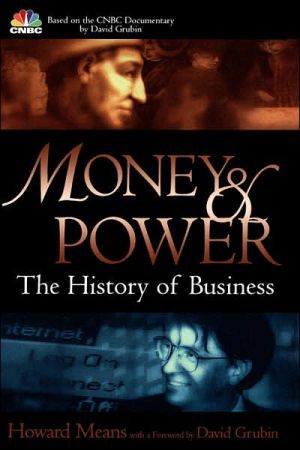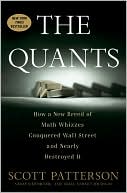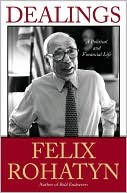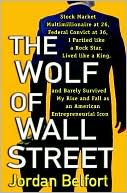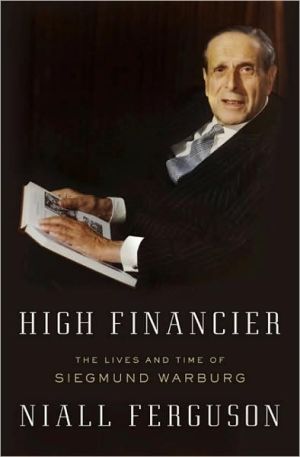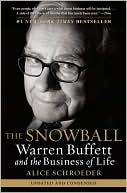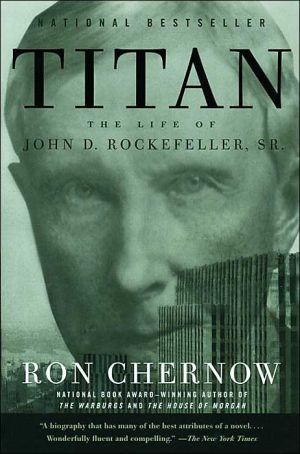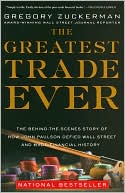Money and Power: The History of Business
Where there's greed and ambition you'll find . . .\ Money & Power\ From the pivotal spice trade routes to the streets where merchants sold their wares . . .from the royal court of Spain where a faulty economic plan led to ruin to early American industrial capitals and assembly lines . . . from the fever pitch of Wall Street to the groundbreaking moments in television and motion picture history.\ CNBC's acclaimed documentary Money and Power deftly traces the movement of trade, banking,...
Search in google:
The dramatic story of greed, money, power, and the moguls and dynasties that have shaped business From merchant ships to microchips, industry has been defined by the powerful business leaders who have caused seismic shifts in the growth of commerce. The companion book to the acclaimed CNBC documentary, Money and Power takes readers on a gripping journey following the movement of power from east to west-from the feudal estates of medieval Europe to the halls of modern finance, from the teeming streets of ancient Venice to the serene campuses of Silicon Valley-to tell the story of how business shaped the modern world, and how the goals of a few ambitious people paved the way to the wealth and prosperity shared by so much of the world's population today. A dramatic narrative focusing on the groundbreakers throughout history-from St. Godric, the twelfth-century monk reviled for his love of money to Bill Gates, the contemporary embodiment of money and power-traces the roots of banking, industry, commerce, and power. Fever-pitch moments in the book center around pivotal figures such as Cosimo de Medici, Philip II, the Rothschilds, J. P. Morgan, the Rockefellers, Henry Ford and others. The authors also extract important lessons about the strategies and tactics used to build these business empires. Booknews Means (journalist, novelist, and senior editor at magazine) describes individuals, groups and events highly influential in the development of European and American commerce in the past 1000 years. Twelve chapters focus on St. Godric, Cosimi de Medici, Philip II, "Tulipmania" in the Netherlands, James Watt and Matthew Boulton, the Transcontinental Railroad, J. Pierpont Morgan, John D. Rockefeller, Henry Ford, Robert Woodruff, Time Warner, and Bill Gates. This companion book to the CNBC documentary is aimed at the same broad audience. Annotation c. Book News, Inc., Portland, OR (booknews.com)
1\ ST. GODRIC\ God and Profit\ Everything has a history. Before there was the Internet, there was the Arpanet. Palm Pilots trace back through laptops and desktops to the 30 ton ENIAC (electronic numerical integrator and computer), which has its roots in the programmable computers invented by the nineteenth-century British mathematician, Charles Babbage. Automobiles were preceded by steam-powered tricycles; trains, by wind-propelled land ships. Bankers are the heirs of money changers whose professional ancestors could be found guarding sacred temples used as safe depositories for personal assets.\ Great fortunes have histories as well. They are created by visionaries who introduce themselves, their products, and ideas into the proper moment in time, the right crease in history. Henry Luce launched his middle-brow magazine empire just as a huge, and largely homogenous, American middle class was taking shape. Robert Woodruff took advantage of a shrinking globe and a second world war to create the first global brand: Coca-Cola. John D. Rockefeller seized control of the oil refining business just as industry was bursting forth with new energy demands. James Watt and Matthew Boulton launched the rotary steam engine under similar conditions a century earlier. For Spain to grow rich off the mineral wealth of the New World, there had to be slave laborers to dig the gold and silver out of the earth, transportation technology to get the precious metals to the Old World, and a market demand to satisfy. Tulip bulbs could soar to astronomical values in the seventeenth-century Netherlands only because the Dutch had made fortunes in sea trading and had a stock market to condition people to accepting risk for reward.\ The transfer of money and power from the cross and crown to the new secular empire of business—the defining change of the last millennium—didn't just happen either. The desire to do business, the impulse to trade for profit, salesmanship born from merchant life—these are instincts nearly as old as the human species. But somewhere around a thousand years ago, a constellation of forces began to pull together in Western Europe.\ War, invasion, and conquest, which had ravaged the continent since before the fall of Rome, abated. Until the Hundred Years' War got underway in 1337, Europe was, relatively speaking, at peace. Plague and pestilence subsided, too, and would stay in the background until the Black Death erupted about 1348, eventually killing perhaps one in two people continent-wide. With the coming of political stability, trade began to flourish throughout the Mediterranean and in the north of Europe, around the Rhine River and Baltic Sea. Cities grew and prospered as well, as land-poor lords started to sell off parts of their holdings in the form of town charters. The combination of growing urban populations and growing trade served to concentrate both marketplaces and workforces. Merchant and artisan guilds, which regulated the quality and price of trades, became powerful advocates of self-government.\ A hunger for opportunity and personal freedom was awakening at the same time that western Europe began to provide the means for fulfilling individual ambition. The seeds of a business-based economy were being sown. And as that happened a handful of people—pioneers of the rough and tumble economic frontier, bold adventurers in the experiment that would come to be known as democratic capitalism—began to emerge.\ \ One of first of these capitalist pioneers was the remarkable Godric. Born in the year 1065 near Walpole in Norfolk, in the east of England, he was the oldest of three children of Anglo-Saxon parents. His father, Aedlward, was a freeman who worked a small croft or an enclosed field, on which he most likely grew subsistence quantities of leeks, parsley, shallots, and the like. In return for the holding and the right to work the home farm, Aedlward was expected to render agricultural services to the lord of the manor. He was also dependent upon the lord's stores for food during famine and for protection in time of war—both being ever-present threats.\ In the normal course of events, Aedlward's life would have become Godric's, but as a young man Godric aspired to something different, and perhaps even then, to something more. While still a teenager, he left his parents, brother, and sister, and set out to find his fortune. For a time he became a peddler, traveling on foot from market town to market town, selling whatever small wares he could lay his hands on at the annual fairs that were the commercial and social meeting place of the times. Working out of a tent or stall, one merchant might sell hair bought cheap at nunneries for women to add to their thinning locks; others might offer wines or furs. Notaries were available to seal contracts. The rich and poor alike gathered to ogle dancing bears, magicians, and stilt walkers. As they traveled from fair to fair, the peddlers would build a network and, if they had high aspirations, would use their new connections to expand their businesses.\ Godric's aspirations soon led him to work as a ship's mate as well as a peddler. Traveling up and down the east coast of the British Isles, he would sell for a profit in the English ports what he had bought cheap from the farmers and craftsmen of Scotland. As his maritime skills expanded, so did his trading network. By age 18, Godric had joined the ranks of the roving merchant-adventurers who led a precarious existence on the margins of the medieval economy, trading freely across the English Channel as they sold ornaments and tapestries to noblemen with a taste for luxury. Instead of answering to the laws and strictures of a lord, as his father had done, Godric was now bound only to the law of profit.\ Simultaneously, England itself was emerging as perhaps the wealthiest country in northern Europe. In 1066, the year after Godric's birth, William the Conqueror had defeated the Anglo-Saxon King Harold on the plains of Hastings and thrown the island kingdom into disarray. By 1086, though, William had consolidated his rule so effectively that his agents could undertake a survey of his lands and people that wouldn't be matched for thoroughness for another eight hundred years. The survey results were collected in two volumes that came to be known as the Great and Little Domesday books because the tax judgments rendered from them were as binding on men as God's final judgment on Doomsday.\ A national currency system was in effect in England: The monetary term "sterling," used to describe the silver penny introduced by William and his Normans, came into common use just as Godric was leaving home for the first time. Social mobility was possible, too. For a man of Godric's extraordinary, even fierce ambition, there couldn't have been a better time and place, and he was clearly not one to let such an opportunity slip by.\ "Thus aspiring ever higher and higher, and yearning upward with his whole heart, at length his great labours and cares bore much fruit of worldly gain," writes his biographer, the monk Reginald of Durham, who got much of the story from Godric himself.\ For he laboured not only as a merchant but also as a shipman ... to Denmark and Flanders and Scotland; in all which lands he found certain rare, and therefore more precious, wares, which he carried to other parts where he knew them to be least familiar, and coveted by the inhabitants beyond the price of gold itself; wherefore he exchanged these wares for others coveted by men of other lands; and thus he chaffered most freely and assiduously. Hence he made great profit in all his bargains, and gathered much wealth in the sweat of his brow; for he sold dear in one place the wares he had bought elsewhere at a small price.\ As the breadth of Godric's revenue stream grew, so did his net worth, and his potential grew with it. Although born in poverty, he found himself in his early thirties the half owner of a merchant ship and part owner of another. In time, he began sailing south out of England to the ports of northern Spain and then through the Straits of Gibraltar. The novelist Frederick Buechner speculates, in his fact-based but fictional account of Godric's life, that as his budding trading fleet began to reach into the Mediterranean, Godric multiplied his profits from each trip by carrying passengers in the hold—pilgrims bound for the Holy Land or the Vatican in Rome—and by small acts of pirating. Still in his thirties, Godric had become truly rich, a merchant king. For good measure, he even befriended and helped a real king, Baldwin I of Jerusalem, after his defeat in 1102 on the plains of Ramleh. Godric is mentioned specifically in the account of that battle as "Gudericus, pirata de regno Angliae."—Godric, pirate of the English kingdom.\ \ Godric was "vigorous and strenuous in mind, whole of limb and strong in body," Reginald of Durham tells us. He was of middle stature, broad-shouldered and deep-chested, with a long face, grey eyes most clear and piercing, bushy brows, a broad forehead, long and open nostrils, a nose of comely curve, and a pointed chin. His beard was thick, and longer than the ordinary, his mouth well-shaped, with lips of moderate thickness; in youth his hair was black, in age as white as snow; his neck was short and thick, knotted with veins and sinews; his legs were somewhat slender, his instep high, his knees hardened and horny with frequent kneeling; his whole skin rough beyond the ordinary, until all this roughness was softened by old age.\ He was also, if Frederick Buechner's Godric is to be believed, a brawler and wencher, an especially shrewd trader and, when necessary, a con man and worse. What Godric seems to have been most of all, though, was a man caught in a dilemma. That dilemma—the intersection of values and money, and the search for meaning among conflicting definitions of success—would continue to trouble businesspeople throughout the millennium that Godric saw begin. Cosimo de' Medici bargained with a Pope to resolve it. John D. Rockefeller would bargain with his Maker, while the contemporary global financier John Templeton has spent a fortune encouraging exploration into God's true nature. (Physicist Freeman Dyson, winner of the year 2000 Templeton Prize for Progress in Religion, received a staggering $948,000.) By the millennium's end, a culture obsessed with finding meaning in a world and workplace radically altered by the technological revolution would be rushing to embrace the spirituality of the new age. Godric, though, had no similar range of options. Then as now, a businessman defined his business progress by the profit he made; but then unlike now, the Roman Catholic Church was very clear on which choice Godric had to make. The only true progress was to be found on the road to salvation, and the pursuit of profit inevitably put that progress, and the soul, at risk.\ On the North Sea island of Lindisfarne, where St. Cuthbert had once been bishop and where Godric sometimes put in to port during his trading voyages, all the irreconcilable claims on his soul appear finally to have overwhelmed him. The community of monks who lived on Farne invited the wealthy merchant to join them in prayer, and as he did so, Godric was overwhelmed with remorse. Am I doing the right thing by my fellow man? he is said to have asked himself, Am I doing right by my maker? Is this trading deceitful? Convinced that he was traveling the wrong path, Godric fell to his knees by the windswept shore where the monks lived and vowed to renounce his life as a merchant, a vow he eventually kept with an almost frightening fidelity. Godric's life as a businessman was over.\ At age 40, with his sins weighing heavily upon him, Godric left behind his worldly goods and set out to lead the life of a hermit. After walking for many months, he joined a fellow hermit, Elric, at Wulsingham in Durham. After Elric's death in 1108, Godric settled for good at Finchale, on the river Wear near Durham, where he built a small wooden chapel to the Virgin Mary and lived for another 57 years.\ At Durham, it is said, Godric mercilessly mortified his flesh in the praise of God. He also developed the gift of prophecy—foretelling, for example, the assassination of Thomas à Becket at his cathedral church in Canterbury in the closing days of 1170—and became a friend of wild animals, many of whom would seek refuge with him when they were being hunted. Even snakes were drawn to him: He kept them as pets, forcing them out of his room only when they distracted him from his prayers. Godric is also credited with being the earliest lyric poet in the English language. One of his works that still survives is a hymn to the Virgin Mary that he set to music. He died shortly before his 105th birthday, on May 21, 1170, and was canonized not long afterward by the Roman Catholic Church.\ To the Catholic Church, Godric's transformation is a triumph of spirituality over the misguided values born of a life devoted to commerce. Precious few of us stand so firmly in our principles that we would sell our businesses and give away our riches to save our souls. Nor is it an easy choice to live out the rest of a very long life without earthly comforts, doing penance in solitude. Not only was Godric able to do all these things, but in doing them, he discovered his true gifts: an astounding ability in lyrical poetry and a special communion with animals. By the standards and understandings of the time, the dramatic reversal of Godric's life is proof enough of saintliness.\ But Godric's life tells a more complex story than the sainthood he earned. Born at a time when capital accumulation for the peasantry was nearly unthinkable, he was nonetheless a model of modern wealth creation: an up-from-the-bootstraps capitalist who transformed the hand fate had dealt him. In both the major decisions of Godric's life—to pursue wealth and to pursue salvation—he chose to give up the safety and comfort of his known world to pursue at great personal risk goals that might in the end be unattainable. In both circumstances he had to break free of his confines, the perceptions of himself, and the expectations he had been born to. If the second half of his life is a model for the eternal conflict between personal values and the pursuit of prosperity, the first half provides a model as well: of the potential of emerging free-market capitalism to create secular wealth—even for those outside of the upper classes. Business was rising with the new millennium. A new kind of economy was starting to take shape. The pursuit of money and power was just beginning to break free of the politics of the church and the crown, and the Western world would never be the same again.
ForewordIntroduction11St. Godric: God and Profit152Cosimo de' Medici: Putting Money to Work273Philip II: Wealth without Wisdom454Tulipmania: Sharing the Greed655James Watt and Matthew Boulton: Turning Evolution into Revolution836The Transcontinental Railroad: Rogues and Visionaries1037J. Pierpont Morgan: The American Colossus1258John D. Rockefeller: Organizing the Octopus1459Henry Ford: Building Cars and the Markets for Them16510Robert Woodruff: The Brand's the Thing18511Time Warner: Turning Opposite Cultures to Common Advantage20512Bill Gates and Cyberspace: The Dematerialized Future227Acknowledgments247Source Notes249Photo Credits255Index257
\ BooknewsMeans (journalist, novelist, and senior editor at magazine) describes individuals, groups and events highly influential in the development of European and American commerce in the past 1000 years. Twelve chapters focus on St. Godric, Cosimi de Medici, Philip II, "Tulipmania" in the Netherlands, James Watt and Matthew Boulton, the Transcontinental Railroad, J. Pierpont Morgan, John D. Rockefeller, Henry Ford, Robert Woodruff, Time Warner, and Bill Gates. This companion book to the CNBC documentary is aimed at the same broad audience. Annotation c. Book News, Inc., Portland, OR (booknews.com)\ \
